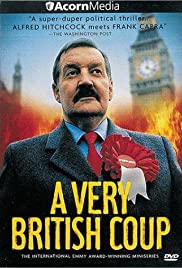
A VERY BRITISH COUP
UK, 1988, 148 minutes, Colour.
Ray Mc Anally, Alan Mac Naughtan, Keith Allen, Geoffrey Beavers, Jim Carter, Tim McI nnerny, Marjorie Yates, Kika Markham.
Directed by Mick Jackson.
A Very British Coup was a celebrated and award-winning miniseries, put together for a television movie. It made quite an impact in 1988 on its release, in the last years of Margaret Thatcher’s time as prime minister. It focuses on government in England, the Conservatives, the Labour Party taking over, a socialist worker from Yorkshire becoming prime minister.
The film won many awards, BAFTAs, Emmys and the grand prize at the Bamff television festival. Ray Mc Anally was best actor in the BAFTA awards.
Ray Mc Anally gives a very strong performance. He was seen over many decades in British films but stood out in his final years in such films as The Mission and as Christy Brown’s father in My Left Foot. There is a British cast of character actors.
The film was directed by Mick Jackson who had worked in British television and, after this, moved to the United States and made a mixed bag of films in the 90s: Chattahoochee, LA Story and, very commercially successful, The Bodyguard. Other films include Clean Slate and Volcano and the fine telemovies Indictment: The Mc Martin Trial and Tuesdays With Morrie.
The film is fast paced, has a great deal of intrigue as well as surface politics and behind-the-scenes coups, with the influence of the politics of the United States.
1. The impact of the film? As a television series? Television film? Its reflecting the politics in the United Kingdom of the 1980s? Margaret Thatcher as prime minister, conservative policies?
2. The title, with reference to Harry Perkins, with reference to Sir Bernard? The ironies of the title?
3. Britain in the 1980s, an authentic and credible England, the picturing of London? Sheffield and Yorkshire? The scenes in parliament, Downing Street? The background of the media, industrial strikes? The musical score?
4. The length of the film, for television audiences? The narration and the tone? The political perspective? Political drama? Political critique?
5. Margaret Thatcher, her England, her policies, her manner of being prime minister, strong? The critique? The picture of the Establishment and the different generations? The background of the Secret Service, surveillance, plots and conspiracies? The media, the BBC? The clubs? Status, high society? The possibilities for social upheaval, revolution?
6. The background of the British Labour Party, its socialist perspective, its origins? The response of people to the Labour Party and parliamentarians? For example the migrants from Pakistan? Labour and its deals, loans? The issue of nuclear disarmament? Economic policies? Issues of truth?
7. The portrait of Harry Perkins? Ray Mc Anally’s performance? His coming from Yorkshire, the unions? Campaigning and the elections? His life in Sheffield? Television appearances, talk, talk shows? The victory? His travelling, strong? His ability to be devious? The interviews? His establishing of his cabinet, the focus on each of the members of the cabinet? Issues of finance, money? The Soviet Union (and the irony of what was to happen within a few years with the collapse of the Soviet Union)? Laurence Wainright, Fred Thompson, Sir Bernard, the staff, Helen, Tom Newsome? How well did the film define each of these characters? Tom Newsome and his strength, the death, the funeral? Labour policies? Harry Perkins and going to the United States, discussions, the nuclear issues and the report on television, the bases? Perkins’ adviser – and his death? The press conference? Health, on the run? Plans and the strike? The gathering of information? Laurence and his role, Sir Bernard, the confrontation, capitulation? Winning? The election? The portrait of Harry, a good man, a statesman?
8. The role of the cabinet, seeing them and their actions, politics, policies? Tom Newsome and the Soviet Union? Sexual issues? Cook, tough, issues of disarmament? Laurence, chancellor, the plot, apology? Ireland?
9. Fred Thompson, jail, work, information, advice? Liz and the cricket? Liz and the family?
10. Sir Bernard, the Establishment, suave? Plotting? Liz and her father? The media, on the fence? The deaths? The final confrontation – and his losing?
11. Fiennes, the information, serious? Chambers? Helen Spencer and the visit?
12. The sketch of Helen Spencer, her role, influence?
13. Reg Smith, the background of the unions, union activities, the blackouts?
14. The picture of the media, in itself, headlines, the meetings, control, the role of the journalists?
15. The policeman, the vote, doing the right thing?
16. The build-up the finale, Harry and his final speech?
17. The importance of this kind of film as providing images and stories about political realities? In its time? Lessons to be learnt in retrospect?